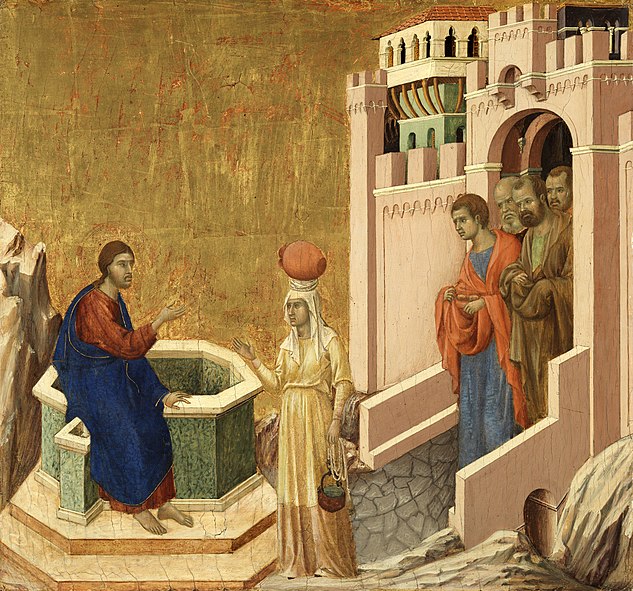CHRIST CONTINUES TO CALL US TO REPENTANCE AND CONVERSION
(A biblical refection on THE THIRD SUNDAY OF LENT [Year B], 8 March 2015)
Gospel Reading: John 2:13-25
First Reading: Exodus 20:1-17 [Ex 20:1-3,7-9,12-17]; Psalms: Psalm 19:8-11; Second Reading: 1Corinthians 1:22-25
The Scripture Text
The Passover of the Jews was at hand, and Jesus went up to Jerusalem. In the temple He found those who were selling oxen and sheep and pigeons, and the money-changers at their business. And making a whip of cords, He drove them all, with the sheep and oxen, out of the temple; and He poured out the coins of the money-changers and overturned their tables. And He told those who sold the pigeons, “Take these things away; you shall not make My Father’s house a house of trade.” His disciples remembered that it was written, “Zeal for Thy house will consume me.” The Jews then said to Him, “What sign have You to show us for doing this?” Jesus answered them, “Destroy this temple, and in three days I will raise it up in three days I will raise it up.” The Jews then said, “It has taken forty-six years to build this temple, and will You raise it up in three days?” But He spoke of the temple of His body. When therefore He was raised from the dead, His disciples remembered that He had said this; and they believed the scripture and the word which Jesus had spoken.
Now when He was in Jerusalem at the Passover feast, many believed in His name when they saw the signs which He did; but Jesus did not trust Himself to them, because He knew all men and needed no one to bear witness of man; for He Himself knew what was in man. (Jn 2:13-25 RSV)
In most stories of the Gospel, Jesus Christ is depicted as gentle, kind, compassionate. However, in once scene at the temple, Lord Jesus is seen fuming mad (see John 2:15). Making a kind of whip of cords, He drove them all, with the sheep and oxen, out of the temple; and He poured out the coins of the money-changers and overturned their tables. And He told those who sold the pigeon, “Take these things away; you shall not make My Father’s house a house of trade” (John 2:16).
Jesus was acting out of compassion for the poor people who were being exploited. Many of these had travelled from afar. The men were carrying their sacrificial lambs on their shoulders, the women carrying their sacrificial doves in little cages. When they got to the temple they were told by the religious authorities that their offerings would not be acceptable. Animals for sacrifice would have to be purchased from them. The religious authorities had created a captive market and were charging exorbitant prices, thus exploiting the people, ripping them off.
In addition, the people who had come to worship were told that their money offerings were unacceptable and that they would have to go to the money changers’ tables and exchange their coins. But the exchange rate was unfair. Again the exploitation. Jesus seeing the situation waded into it. He recognized the need to protest against such injustice.
Jesus’ kind of anger was undoubtedly positive and wholesome, one that was directed to a just cause. Sometimes we Christians, have to have this kind of anger. Like the Lord, sometimes we have to speak out when we are confronted by obvious injustices and exploitations in our midst.
In this today’s Gospel, Jesus condemned the worship which had become commercialized and largely hypocritical but He did not stop there. He fully intended to replace it with the perfect form of worship, the sacrifice of Himself on the cross. When the temple officials demanded the sign for His authority, Jesus responded: “Destroy this temple, and in three days I will raise it up” (John 2:19). The statement was admittedly obscure to the officials, but St. John, the evangelist explains to us that Jesus was referring to the temple of His body. It was a figure of speech. The inadequate worship with the temple would find perfection in the sacrifice of Jesus, the true temple of God. The animal offerings of Judaism would be replaced by the self-oblation of the Son of God in His death and resurrection.
Have we (you and I) ever “turned our Father’s house into a market place”? We have if we have considered them as just some kind of centers of mechanical worship, offering of masses without real communities of love and true spirit of caring.
We are now in the third week of Lent. Christ continues to call us to repentance and conversion but how many of us have been contented with merely window-dressing our hearts instead of changing them from within as to our motives, attitudes and desires. While there is still time left to Lent and to our life, let us listen to our Lord’s words with our hearts and not with our ears, lest we miss the meaning He intends for us.
Short Prayer: Heavenly Father, we invite You to come into our hearts and free us from anything that distracts us from our commitment to You. We love You, Father; our lives belong to You. Give us the power to follow Your commands and to serve You in gratitude and love. Amen.








